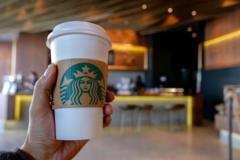Starbucks has introduced a temporary ban on using the names of six presidential candidates on its app, including those of Kim Moon-soo and Lee Jae-myung, amidst escalating political tensions as South Korea prepares for its upcoming elections. The coffee giant aims to maintain political neutrality during this critical season, a sentiment echoed by other large companies like Naver, which has also restricted political candidate search suggestions.
The firm’s statement indicated the goal of providing a pleasant customer experience while preventing any misunderstanding among patrons or staff. This is a notable first for Starbucks in South Korea, as political expressions have seeped even into daily transactions, prompting customers to place orders with politically charged nicknames.
Responses to the ban are mixed; some South Koreans view the policy as overly sensitive while others appreciate the gesture for avoiding potential conflict. For example, regular customers noted the significant ideological divides in discussions post-Yoon's impeachment, suggesting the public mood is cautious.
In addition, South Korean celebrities and public figures remain vigilant about political implications in their public appearances and comments during election periods. Treads and fashion choices are carefully monitored, as wearing particular colors associated with political parties can provoke public backlash.
Industry experts emphasize the need for open dialogue and understanding of diverse opinions, yet many citizens are opting for silence in the face of stark political divides to avoid contention. Ultimately, the Starbucks ban encapsulates the complex navigation of neutral territory in a politically charged atmosphere, echoing broader societal challenges as South Korea approaches its electoral decision.
The firm’s statement indicated the goal of providing a pleasant customer experience while preventing any misunderstanding among patrons or staff. This is a notable first for Starbucks in South Korea, as political expressions have seeped even into daily transactions, prompting customers to place orders with politically charged nicknames.
Responses to the ban are mixed; some South Koreans view the policy as overly sensitive while others appreciate the gesture for avoiding potential conflict. For example, regular customers noted the significant ideological divides in discussions post-Yoon's impeachment, suggesting the public mood is cautious.
In addition, South Korean celebrities and public figures remain vigilant about political implications in their public appearances and comments during election periods. Treads and fashion choices are carefully monitored, as wearing particular colors associated with political parties can provoke public backlash.
Industry experts emphasize the need for open dialogue and understanding of diverse opinions, yet many citizens are opting for silence in the face of stark political divides to avoid contention. Ultimately, the Starbucks ban encapsulates the complex navigation of neutral territory in a politically charged atmosphere, echoing broader societal challenges as South Korea approaches its electoral decision.






















